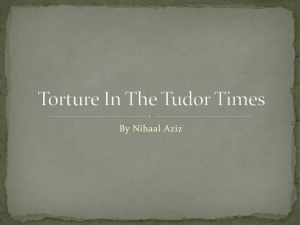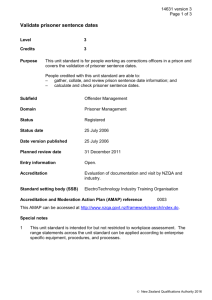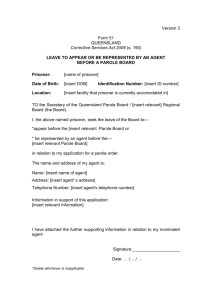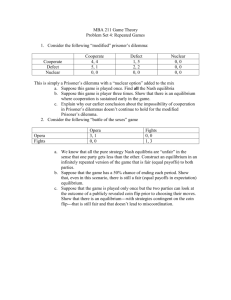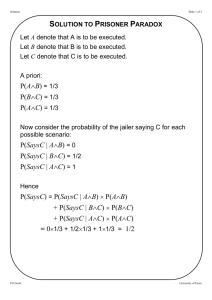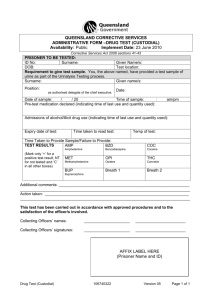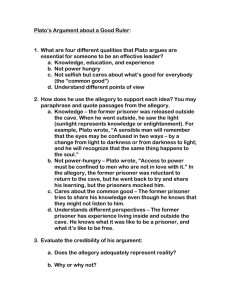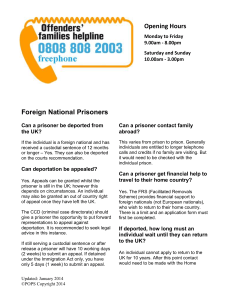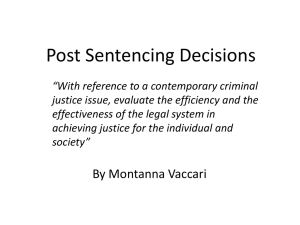Parole - Offenders families helpline
advertisement
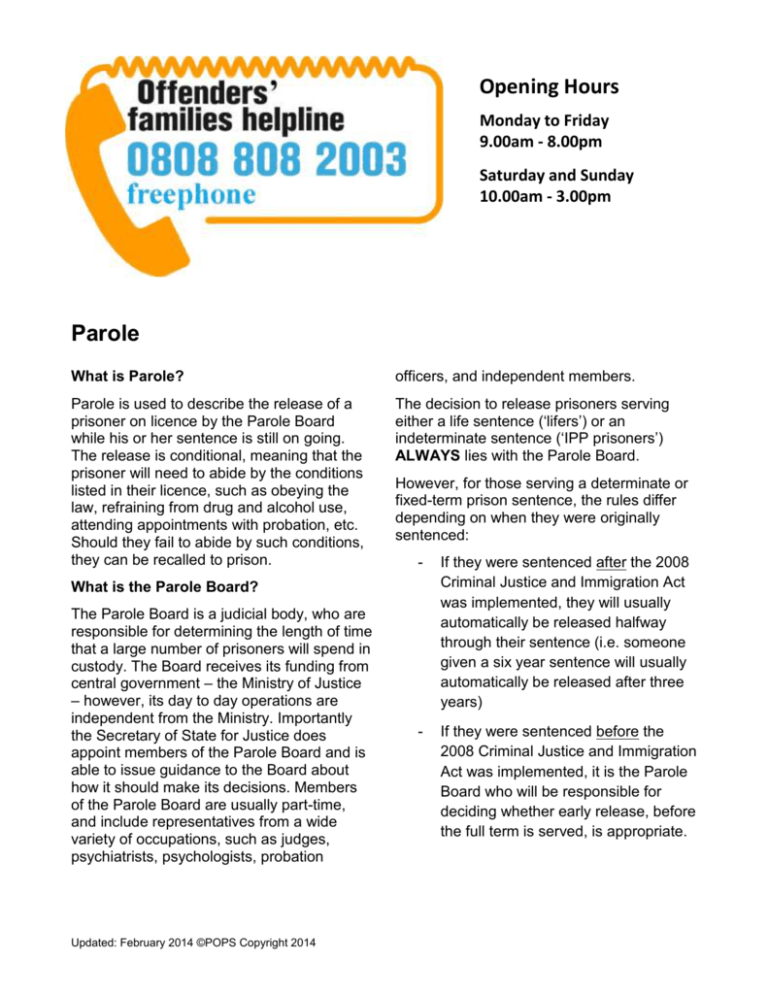
Opening Hours Monday to Friday 9.00am - 8.00pm Saturday and Sunday 10.00am - 3.00pm Parole What is Parole? officers, and independent members. Parole is used to describe the release of a prisoner on licence by the Parole Board while his or her sentence is still on going. The release is conditional, meaning that the prisoner will need to abide by the conditions listed in their licence, such as obeying the law, refraining from drug and alcohol use, attending appointments with probation, etc. Should they fail to abide by such conditions, they can be recalled to prison. The decision to release prisoners serving either a life sentence (‘lifers’) or an indeterminate sentence (‘IPP prisoners’) ALWAYS lies with the Parole Board. However, for those serving a determinate or fixed-term prison sentence, the rules differ depending on when they were originally sentenced: - If they were sentenced after the 2008 Criminal Justice and Immigration Act was implemented, they will usually automatically be released halfway through their sentence (i.e. someone given a six year sentence will usually automatically be released after three years) - If they were sentenced before the 2008 Criminal Justice and Immigration Act was implemented, it is the Parole Board who will be responsible for deciding whether early release, before the full term is served, is appropriate. What is the Parole Board? The Parole Board is a judicial body, who are responsible for determining the length of time that a large number of prisoners will spend in custody. The Board receives its funding from central government – the Ministry of Justice – however, its day to day operations are independent from the Ministry. Importantly the Secretary of State for Justice does appoint members of the Parole Board and is able to issue guidance to the Board about how it should make its decisions. Members of the Parole Board are usually part-time, and include representatives from a wide variety of occupations, such as judges, psychiatrists, psychologists, probation Updated: February 2014 ©POPS Copyright 2014 When can a prisoner with a determinate sentence apply for parole? A prisoner serving a determinate sentence (not: life / IPP / extended) can apply for parole up to six months before their Parole Eligibility Date (PED) – i.e. the earliest possible release date. When their Parole Eligibility Date is will depend entirely on the type and length of sentence they were given in court. It will not be earlier than the half way point of their sentence, however. How does a prisoner with a determinate sentence apply for parole? A prisoner should be given an application form around six months prior to their PED, asking whether they wish to be considered for early release. If the prisoner does wish to be released subject to parole then they should complete and submit this application. If they need help with this application then their personal officer or prison parole clerk may be able to help them. Once the application has been submitted then the prison will compile a file on the prisoner. This file is called the ‘dossier’ .This will include information about the crimes committed, the prisoner’s time in prison (e.g. whether they have completed the courses recommended in their sentence plan etc.) and their plans for release. Once the file is complete, the prisoner will have the opportunity to read it and make a written contribution. This part of the dossier is called ‘the prisoner’s representations’. They should ask their solicitor for help with this. Once the file is complete then three members of parole board (often called ‘the panel’) will meet to review it and discuss the case. The prisoner cannot attend this meeting unless an oral hearing is requested. The Parole Board is not part of the Prison Service and will make an independent Updated: February 2014 ©POPS Copyright 2014 decision. The parole board will consider the possibility of the prisoner committing further offences upon release and will discuss the potential risk to the public if parole is granted. Release can only be granted, however, where the prisoner has fulfilled the requirements of their sentence. When will the prisoner (determinate sentence) receive the Parole Board’s decision? It can take around six months for the whole process to be dealt with and for the parole board to make a decision. Once a decision has been made the prisoner will usually be told within a few days. The prisoner should receive the decision in writing along with the reasons for it. When will the prisoner (determinate sentence) be released once parole is granted? If the prisoner’s application for parole is granted then they will be released on their PED. If their PED has passed because their initial application was refused then they should be released at the earliest opportunity. What happens if parole is not granted (determinate sentence)? If parole is refused, (sometimes called a ‘knock back’) then the prisoner should speak to their solicitor to see if there are any grounds in the refusal that can be challenged. If it is not possible to challenge the decision then the prisoner will usually have to wait a year before they can apply again. The decision can only be challenged if information that should have been in the dossier was missing, if the correct procedure was not followed or if the reasons given for the ‘knock back’ were not good enough. The decision cannot be challenged purely because the prisoner disagrees with it. When can an IPP prisoner or a prisoner serving life imprisonment apply for parole? IPP prisoners and those serving life do not have to apply for parole themselves. If the prisoner is serving a long sentence they will first be contacted 3 years before their tariff runs out. Their tariff is the minimum time to be served in custody. If the prisoner is serving a shorter sentence they will be contacted at least 6 months before their tariff runs out. The prisoner cannot be considered for release until they have served their tariff. The judge who sentenced them should have told them how long their tariff is. What happens next (IPP prisoners or life sentences)? The prison will compile a file on the prisoner, called the ‘dossier’ .This will include information about the crimes committed, the prisoner’s time in prison (e.g. whether they have completed the courses recommended in their sentence plan etc) and their plans for release. Once the file is complete, the prisoner will have the opportunity to read it and make a written contribution. This part of the dossier is called ‘the prisoner’s representations’. They should ask their solicitor for help with this. Once the file is complete, a member of the Parole Board will read it and decide whether to invite the prisoner to attend a meeting with the panel. This is called an oral hearing. This member can also decide that the prisoner should not be released. If they do so, the prisoner has the right to ask for an oral hearing. If the Parole Board decides to invite the prisoner to a hearing, 3 members of the Board will attend. The prisoner can have his/her solicitor at this hearing, and there Updated: February 2014 ©POPS Copyright 2014 may be other witnesses, such as the prisoner’s Offender Manager or the prison psychologist. The Parole Board is not part of the Prison Service and will make an independent decision. The parole board will consider the possibility of the prisoner committing further serious offences upon release and will discuss the potential risk to the public if parole is granted. The Parole Board can only grant release if they determine that the risk the prisoner poses to the public has been significantly reduced. Furthermore, release can only be granted where the prisoner has fulfilled the requirements of their sentence. Consequently, the prisoner is therefore entitled to regular reviews of the case by the Parole Board. When will the prisoner (IPP prisoners or life sentences) receive the Parole Board’s decision? It can take around six months for the whole process to be dealt with and for the parole board to make a decision. Once a decision has been made the prisoner will usually be told within 2 weeks. The prisoner should receive the decision in writing along with the reasons for it. If Parole is granted, the prisoner is likely to be released either on life licence, or to open conditions first to allow them to readjust to life back within the community. If the prisoner is unhappy with the decision made, they should seek advice from their solicitor. What happens if parole is not granted (IPP prisoners or life sentences)? If parole is refused, the Secretary of State will decide when the next review will be. They cannot leave it more than 2 years without asking the prisoner first. Can the victim of the crime stop a prisoner being released? The parole board has to take into account the views of the victim about the prisoner’s release. However it would be very rare for the victim to be a part of the release decision. This is because the victim does not have access to information about the prisoner’s time in prison, how they have addressed their offending behaviour and how they might have changed. Updated: February 2014 ©POPS Copyright 2014
